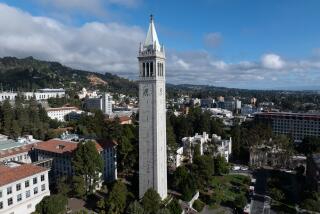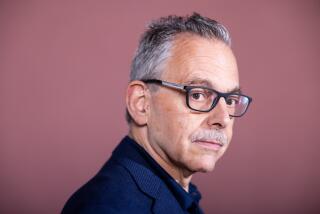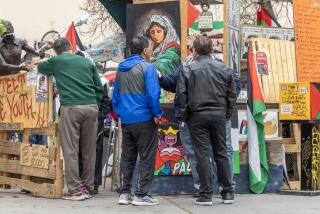CSUN Event Touts Pan African Studies
- Share via
James Dennis, one of the first Pan African Studies professors at Cal State Northridge, laments that students’ social consciousness has declined since the department was established in 1969.
To mark the 31st anniversary, Dennis and department co-founder Barbara Rhodes--both of whom still teach in the department--urged students Monday to remember the struggle that helped produce the university’s Pan African Studies program.
The program began during the turbulent 1960s, when about 50 students protested against the university’s apparent failure to respond to a public assault by a CSUN coach on a black athlete. The students blockaded the administration building and demanded that officials fire the assistant coach who had kicked or shoved the football player--the facts are disputed--during a game.
The November 1968 protests, which resulted in the arrest of 19 students, later garnered support from Students for a Democratic Society. Among the students’ demands was a call for minority-oriented programs. By the next year, the university established the Pan African Studies department--originally called African American Studies.
“It’s very sad, but many African American students . . . take for granted that they have black faculty, black students on campus today,” Rhodes told Monday’s gathering. “Those students 32 years ago sacrificed because they wanted an authentic education. The responsibility you have is to continue to pave the way and protect the vision of the students who revolted to start the department.”
Rhodes, also director of the DuBois-Hamer Institute, which works closely with the department in recruitment and retention efforts, decried the “all too entrenched apathy” of students on campus.
Students from Omowale Ujamaa Northwest Community School of Pasadena, an African-centered private school, performed a tribute to their ancestors as part of Monday’s observance. Rhodes said she invited them in the hope that university students will be inspired to activism after seeing that young children were learning the roots of their identity so early on.
Senior Bobby Rodgers, a biomedical physics major, said the celebration was really about the children.
“Black Studies cleared the way for Women’s Studies, Chicano Studies, Asian Studies,” Rodgers said. “It had a domino effect. All the way down to the kids, where it’s going to continue on.”
More to Read
Sign up for Essential California
The most important California stories and recommendations in your inbox every morning.
You may occasionally receive promotional content from the Los Angeles Times.













